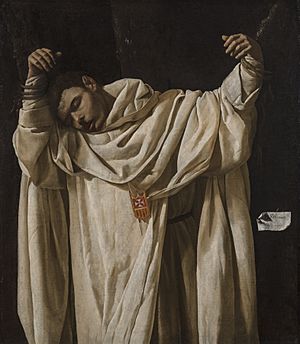Saint Serapion (Zurbarán) facts for kids

The painting Saint Serapion or The Martyrdom of Saint Serapion was created in 1628. It is an oil painting on canvas by the Spanish artist Francisco Zurbarán (1598–1664). The Mercedarian Order asked Zurbarán to paint this work. It was meant for their monastery in Seville, Spain. Today, you can see it at the Museum of Fine Arts of Seville. Zurbarán was famous for painting monks and saints. He often showed them praying or as martyrs.
Contents
About the Painting
Zurbarán shows Saint Serapion in a special way. The saint looks like he is almost crucified. His hands are tied with ropes and chains to a bar above him. His head seems to be lifted by his cape. The painting shows him from his knees up. The way his clothes hang shows how much strain is on his arms. A small note on his chest helps us know it is Saint Serapion.
Who Was Saint Serapion?
Serapion of Algiers (1179–1240) was a Mercedarian friar. He fought in the Third Crusade in 1196. Later, he became a martyr. A martyr is someone who dies for their beliefs. Art critics have compared how Zurbarán painted Saint Serapion's death to other martyrs. They note that Serapion's violent death is shown in a calm and quiet way.
Light and Shadow in the Painting
The painting uses a technique called chiaroscuro. This means it uses strong contrasts between light and dark. It is part of the Spanish Tenebrist style, like the artist Jusepe de Ribera. The white paint used for Serapion's clothes is very important. It makes the painting feel peaceful. The dark shadows in the deep folds of his robes create tension.
In 2003, the Scottish painter Alison Watt described the painting. She said that each fold of cloth is simple, just light and shadow. She felt that this simplicity draws you in. But then you realize Zurbarán has made the simple fabric seem divine. He used pure, beautiful white paint to do this.
Influence
The painting of Saint Serapion has inspired other artists. The American poet Frank O'Hara mentioned it in his poem "Meditations in an Emergency." He wrote:
- St. Serapion, I wrap myself in the robes of your whiteness which is like midnight in Dostoevsky.
See also
 In Spanish: San Serapio (Zurbarán) para niños
In Spanish: San Serapio (Zurbarán) para niños
 | Selma Burke |
 | Pauline Powell Burns |
 | Frederick J. Brown |
 | Robert Blackburn |

